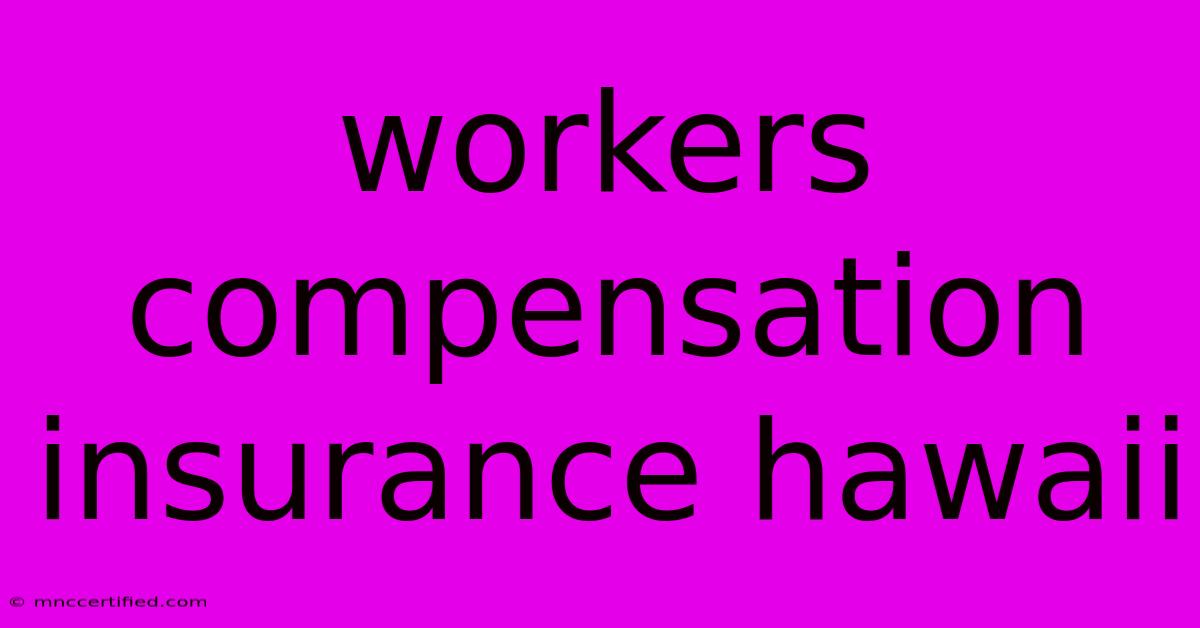Workers Compensation Insurance Hawaii

Table of Contents
Navigating Workers' Compensation Insurance in Hawaii: A Comprehensive Guide
Hawaii, known for its stunning beaches and vibrant culture, also has a robust system for protecting workers in the event of an on-the-job injury. Understanding workers' compensation insurance in Hawaii is crucial for both employers and employees, ensuring everyone is protected and aware of their rights and responsibilities.
What is Workers' Compensation Insurance in Hawaii?
Workers' compensation insurance is a type of insurance that employers are required to carry in Hawaii. This insurance provides financial benefits and medical care to employees who are injured or become ill as a result of their work. This includes a wide range of scenarios, from workplace accidents to illnesses contracted due to work conditions.
Why is Workers' Compensation Insurance Important in Hawaii?
For Employers:
- Legal Compliance: It's mandatory in Hawaii for employers to provide workers' compensation coverage. Failure to do so can lead to significant fines and penalties.
- Financial Protection: Workers' compensation insurance shields employers from potentially crippling lawsuits from injured employees.
- Employee Retention: Providing workers' compensation demonstrates a commitment to employee safety and well-being, enhancing employee morale and retention.
For Employees:
- Financial Security: Workers' compensation provides financial support in the form of lost wages and medical expenses if they are injured or become ill at work.
- Medical Care: This insurance covers necessary medical treatment, including doctor visits, surgeries, and rehabilitation.
- Peace of Mind: Knowing that you are protected in the event of a work-related injury or illness brings a sense of security and allows you to focus on recovery.
Key Components of Hawaii's Workers' Compensation System
-
Employer Responsibility: Employers in Hawaii are responsible for providing workers' compensation coverage to their employees. This means paying premiums to an insurance carrier and ensuring all employees are covered.
-
Claims Process: When an employee suffers a work-related injury or illness, they must report it to their employer immediately. The employer then files a claim with the insurance carrier, and the injured worker receives medical care and benefits.
-
Benefits: Workers' compensation benefits include:
- Medical Expenses: Coverage for medical care related to the injury or illness.
- Lost Wages: Partial or full replacement of lost wages while recovering.
- Permanent Disability Benefits: Payments for permanent impairments resulting from the injury or illness.
- Death Benefits: Payments to the deceased worker's dependents in the event of a work-related fatality.
-
Dispute Resolution: If an employer and employee disagree about the claim or benefits, they can utilize the Hawaii Labor & Industrial Relations Appeals Board for dispute resolution.
Navigating the System: Tips for Employers and Employees
For Employers:
- Choose the Right Insurance Carrier: Carefully research and compare different insurance carriers to find the best coverage and rates for your business.
- Develop a Safety Program: Proactively promote workplace safety with comprehensive training, safety protocols, and regular safety audits.
- Stay Informed: Keep up-to-date on changes in Hawaii's workers' compensation laws and regulations.
For Employees:
- Know Your Rights: Familiarize yourself with your rights and responsibilities under Hawaii's workers' compensation laws.
- Report Injuries Promptly: Immediately report any work-related injuries or illnesses to your employer.
- Seek Medical Attention: Follow your doctor's recommendations for treatment and recovery.
Additional Considerations for Hawaii Employers
- Hawaii Occupational Safety and Health Administration (HIOSHA): Employers must also comply with HIOSHA regulations, which aim to prevent work-related injuries and illnesses.
- Employee Classification: Be sure to correctly classify your employees to ensure they receive appropriate coverage under workers' compensation.
- Independent Contractors: Be aware of the specific laws governing independent contractors and their coverage under workers' compensation.
Resources for Further Information
- Hawaii Department of Labor and Industrial Relations:
- Hawaii Workers' Compensation Insurance:
Conclusion
Workers' compensation insurance is an essential aspect of operating a business and ensuring employee safety in Hawaii. By understanding your rights and responsibilities, both employers and employees can navigate this system effectively and protect themselves in the event of a work-related injury or illness. Remember to consult with a qualified insurance professional for personalized advice and guidance.

Thank you for visiting our website wich cover about Workers Compensation Insurance Hawaii. We hope the information provided has been useful to you. Feel free to contact us if you have any questions or need further assistance. See you next time and dont miss to bookmark.
Featured Posts
-
Hydrocele Surgery Cost With Insurance
Nov 10, 2024
-
U 19 T20 World Cup Nepals Winning Streak Continues
Nov 10, 2024
-
Alabama Vs Lsu 2024 Game Odds
Nov 10, 2024
-
Actor Tony Todd Of Candyman Passes Away
Nov 10, 2024
-
How Much Are Retainers With Insurance
Nov 10, 2024